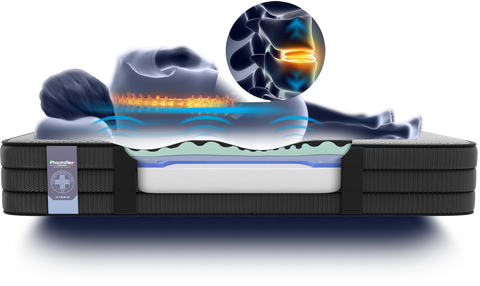
Oversleeping: dormire troppo fa male
Sicuramente sai quanto sia importante la giusta quantità di sonno ogni notte. Dormire è essenziale per ricaricare le batterie del nostro corpo e mente.
Ma, mentre la maggior parte di noi è consapevole dei problemi legati al dormire troppo poco, potresti sorprenderti nel sapere che anche l'opposto, ovvero l' oversleeping, ha ripercussioni sulla nostra salute.
Sì, hai capito bene: dormire troppo non solo può lasciarti stanco, ma può anche avere effetti negativi sulla tua salute a lungo termine. Ecco perché è fondamentale capire le cause e le conseguenze di questo comportamento e come evitare di cadere in questa trappola.
Che cosa significa oversleeping?
L'oversleeping, si riferisce al comportamento di dormire ben oltre la quantità di sonno raccomandata per la propria età e le proprie esigenze personali. Non stiamo parlando di quei giorni in cui ti concedi qualche ora in più di sonno dopo una settimana particolarmente stressante, ma piuttosto di un pattern costante in cui si tende a dormire molto più delle consuete 7-9 ore raccomandate per gli adulti.
Mentre dormiamo, il nostro corpo svolge numerose funzioni vitali, come la riparazione cellulare, la regolazione ormonale e la consolidazione della memoria.
Troppo poco sonno può ostacolare queste funzioni, ma anche dormire troppo può alterare questi processi, creando uno squilibrio nel nostro sistema interno. Pertanto, come in molte cose nella vita, la chiave sta nel trovare il giusto equilibrio.
Perché dormiamo troppo?
Dormire troppo non è sempre una scelta, ma spesso una conseguenza di vari fattori. Ci sono molteplici ragioni che potrebbero spingerti a trascorrere più tempo sotto le coperte di quanto tu desideri o di quanto sia effettivamente benefico per te.
Iniziamo con l'ambiente in cui dormi. Un materasso inadatto può portare a un sonno di scarsa qualità. Se la superficie non è abbastanza confortevole o non offre il giusto supporto, potresti ritrovarti a dormire in modo discontinuo, cercando inconsciamente di compensare la carenza di sonno profondo prolungando le ore a letto.
Parametri come la densità della schiuma possono alterare la percezione di comodità. Un materasso inadatto può anche acuire problemi come mal di schiena, costringendoti a cercare una posizione confortevole per gran parte della notte, e dunque a prolungare il tempo di sonno.
Alcune persone, purtroppo, soffrono di disturbi del sonno come l'ipersonnia, che le spinge a dormire eccessivamente senza una causa apparente. Questo disturbo porta a una sonnolenza inspiegabile durante il giorno, con la tendenza ad addormentarsi in momenti inopportuni. Ci sono anche condizioni come l'apnea ostruttiva del sonno, che interrompe brevemente la respirazione durante la notte, compromettendo la qualità del sonno e spingendo a dormire di più per compensare. Anche la narcolessia può essere una causa: questo disturbo altera la capacità del corpo di gestire i cicli di sonno, portando le persone a oscillare tra sonno e veglia in momenti inaspettati.
Chi soffre di depressione o ansia può trovare difficile ottenere un sonno riposante durante la notte e, come risultato, potrebbe passare più tempo a letto nella speranza di sentirsi riposato. Questo comportamento, purtroppo, può aggravare le condizioni di salute mentale, creando un circolo vizioso difficile da interrompere.
C'è un diffuso malinteso secondo cui l'alcol possa aiutare a dormire meglio. In realtà, l'alcol può alterare i ritmi di sonno, riducendo la fase REM, che è fondamentale per un sonno di qualità. Questo significa che, anche dopo molte ore a letto, potresti svegliarti stanco. L'uso di sonniferi e altri farmaci, se non correttamente prescritti e monitorati, può anche interferire con i cicli naturali del sonno.
A livello fisico, l'oversleeping può aumentare il rischio di malattie come diabete, obesità e problemi cardiaci, mentre può causare anche mal di schiena e affaticamento muscolare. Psicologicamente, troppo sonno può abbassare l'umore, predisporre a depressione e ansia e ridurre le capacità cognitive come memoria e concentrazione. Inoltre, influisce sulla nostra produttività e può privarci di momenti preziosi con i propri cari, alterando la nostra routine.
Il ruolo del materasso nella qualità del sonno
La qualità del sonno che sperimentiamo ogni notte non è solo una questione di quanto tempo trascorriamo a letto, ma anche di come dormiamo. Un buon materasso può prevenire dolori al collo, alla schiena e assicurare un sonno profondo e ristoratore, mentre uno di scarsa qualità può interrompere il sonno, spingendo qualcuno a dormire di più per compensare. I materassi ortopedici di Pharmaflex, ad esempio, sono progettati per sostenere adeguatamente la spina dorsale e ridurre la pressione sui punti di contatto del corpo.

Non sempre è necessario sostituire completamente un materasso. I topper ortopedici possono essere una soluzione ideale per migliorare un materasso esistente. Funzionano come una sorta di aggiunta al tuo materasso, forniscono un ulteriore strato di comfort e sostegno, rendendo il tuo letto ancora più accogliente.
Non dimenticare che la testa e il collo necessitano di un sostegno adeguato durante il sonno. I cuscini ortopedici sono progettati per fornire questo tipo di sostegno, in modo da garantire il corretto allineamento della spina dorsale, prevenendo così tensioni e dolori.
L'oversleeping, benché possa sembrare innocuo o addirittura desiderabile, ha implicazioni profonde sulla nostra salute fisica e mentale. Come abbiamo visto, dormire più del necessario può avere effetti negativi tanto quanto la mancanza di sonno. Al di là della durata, però, la qualità del sonno è fondamentale. Creare un ambiente di sonno ottimale, sostenuto da prodotti di alta qualità come quelli offerti da Pharmaflex, è uno dei modi più efficaci per assicurarsi notti riposanti e giornate produttive. Ricordiamo che prendersi cura del proprio sonno significa prendersi cura della propria salute, del proprio benessere e, in ultima analisi, della qualità della vita.
